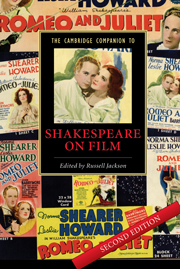Book contents
- Frontmatter
- Introduction: Shakespeare, films and the marketplace
- Part I Adaptation and its Contexts
- Part II Genres and Plays
- Part III Directors
- Part IV Critical Issues
- 14 Looking at Shakespeare’s women on film
- 15 National and racial stereotypes in Shakespeare films
- 16 Shakespeare the illusionist: filming the supernatural
- 17 Shakespeare’s cinematic offshoots
- Further Reading
- Filmography
- Index
- Series List
17 - Shakespeare’s cinematic offshoots
from Part IV - Critical Issues
Published online by Cambridge University Press: 28 July 2007
- Frontmatter
- Introduction: Shakespeare, films and the marketplace
- Part I Adaptation and its Contexts
- Part II Genres and Plays
- Part III Directors
- Part IV Critical Issues
- 14 Looking at Shakespeare’s women on film
- 15 National and racial stereotypes in Shakespeare films
- 16 Shakespeare the illusionist: filming the supernatural
- 17 Shakespeare’s cinematic offshoots
- Further Reading
- Filmography
- Index
- Series List
Summary
In the year 2000, King Lear walked into the Namibian desert. In 2002, his Fool was murdered in Liverpool’s post-industrial docks. Meanwhile Richard III clawed his way to the top of East Los Angeles’s drugs gangs, the Macbeths took over a fast-food restaurant, Othello became Commissioner of the Metropolitan Police, and Hamlet learned to trust her uncle. Shakespeare, that is, provided the narrative spine for the Dogme experimental film The King is Alive (dir. Kristian Levring, Denmark, 2002), the bleak British social allegory My Kingdom (dir. Don Boyd, UK, 2002), the Hollywood exploitation movie The Street King (dir. James Gavin Bedford, USA, 2002), the comedy Scotland PA (dir. Billy Morrissette, USA, 2001), Geoffrey Sax and Andrew Davies’s t.v. Othello (2001) exploring contemporary race and gender problems, and the teen thriller The Glass House (dir. Daniel Sackheim, USA, 2001). Diverse in form, technique, audience and achievement, these updatings represented a practice as old and intriguing as Shakespearean cinema itself. In 1911 the British trade press welcomed the Danish silent film Desdemona, where a jealous modern actor murders his wife on-stage during a performance of Othello. The producers were congratulated for understanding the public, for providing not 'unadulterated Shakespeare' but 'a good modern play with a plot not too deep but just deep enough for mental exercise without effort, while interest and excitement are sustained throughout'. There were 'countless hordes to whom the Bard’s plays do not appeal in the remotest degree', but making a film 'so to speak, around the tragedy of Othello' should suit and satisfy and perhaps improve this mass audience.
- Type
- Chapter
- Information
- The Cambridge Companion to Shakespeare on Film , pp. 303 - 323Publisher: Cambridge University PressPrint publication year: 2007
- 1
- Cited by



